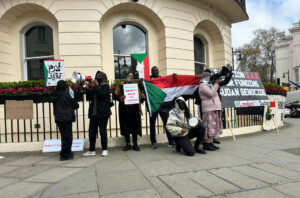UNITAMS ‘disappointed’ as Sudan denies senior expert’s visa
The United Nations Integrated Transition Assistance Mission in Sudan (UNITAMS) has issued a statement in light of news reports that incorrectly highlighted the issue of the visa situation of Dame Rosalind Marsden* in Sudan and her relationship with UNITAMS and the UN.
 Dame Rosalind Marsden (File photo: Chatham House)
Dame Rosalind Marsden (File photo: Chatham House)
The United Nations Integrated Transition Assistance Mission in Sudan (UNITAMS) has issued a statement in light of news reports that incorrectly highlighted the issue of the visa situation of Dame Rosalind Marsden* in Sudan and her relationship with UNITAMS and the UN.
The statement issued by the UNITAMS spokesperson in Khartoum today highlights: “Dame Rosalind Marsden has been reported in the past two days to either have been deported, denied entry visa, denied residency permit extension, or expelled. News reports have also incorrectly characterised her relationship with the UNITAMS and the United Nations in Sudan.”
The UNITAMS statement clarifies that Dame Rosalind is “a senior expert working with the UN in Sudan and has been a senior consultant to the UN in Sudan since July 2021. In this capacity, she has been supporting on a series of integrated peacebuilding assessments, intended to help UN Agencies and partners design and prioritise needs for support at the state level and Juba Peace Agreement (JPA) implementation and monitoring.
“We were glad to have Dame Rosalind’s assistance to this activity, given her deep knowledge of Sudan and effective international networks.”
The UNITAMS statement expresses the mission’s disappointment “that after considering the application for many weeks, the authorities have chosen not to renew her residency visa. The decision is unfortunate especially given the recent request of the Sudanese authorities for UNITAMS and its partners to devote more attention to support for peacebuilding and mobilising resources for many priority activities.”
In an op-ed republished by Radio Dabanga in October 2020, Dame Rosalind voiced optimism that “Sudan is looking towards a brighter future” following the signing of the Juba Peace Agreement, calling it “an important first step towards bringing peace to the conflict zones and laying the foundation for democratic transition and economic reform throughout the country”.
Relations between the government of Sudan and UNITAMS have been strained recently, following the March 29 briefing by UNITAMS head Volker Perthes to the UN Security Council (UNSC) about Sudan’s deteriorating economic, humanitarian, and security situation. Perthes pleaded with the UNSC, saying: “Time is not on Sudan’s side, and I speak to you today with a sense of urgency which is also increasingly felt by Sudanese stakeholders concerned about the stability and the very existence of their country.”
As retort, the Sudan Ministry of Foreign Affairs said that UNITAMS “should focus on the other basic aspects of its mandate, instead of focusing most of its activities on only the political side”.
The head of Sudan’s ruling junta, Gen Abdelfattah El Burhan, subsequently threatened to expel Perthes from Sudan, accusing him of “overstepping the mandate of the UN mission” and interfering in Sudanese affairs.
Last month, Acting Undersecretary of the Sudan Ministry of Foreign Affairs, Ambassador Nader Yousef El Tayeb, handed over a matrix to members of the UN Security Council in New York, that includes the government’s requirements from UNITAMS to assist with democratic transition in Sudan.
Ambassador El Tayeb, who was visiting New York to meet with the leadership of the United Nations and some member states of the UN Security Council, met with UN Under-Secretary-General for Political and Peacebuilding Affairs, Rosemary DiCarlo. According to the official Sudan News Agency (SUNA), El Tayeb indicated that all the competent authorities in Sudan have participated in the development of a comprehensive matrix that includes the vision of the government of Sudan for the role that UNITAMS should play in accordance with its mandate.
* Dame Rosalind Marsden DCMG was the EU Special Representative for Sudan from September 2010 until October 2013.
Before joining the EU, she had a long career in the British diplomatic service, including postings as Consul-General in Basra, British Ambassador to Sudan and British Ambassador to Afghanistan.
She has also served as Head of the United Nations Department and Director (Asia-Pacific) in the Foreign and Commonwealth Office in London.
Earlier in her career she served twice in the British Embassy in Tokyo and spent two years on secondment to the private sector, working in the corporate finance department of an investment bank.
She received her BA in Modern History from Somerville College, Oxford and her D.Phil from St Antony’s College, Oxford. @MarsdenRosalind
(Source: Chatham House)











 and then
and then